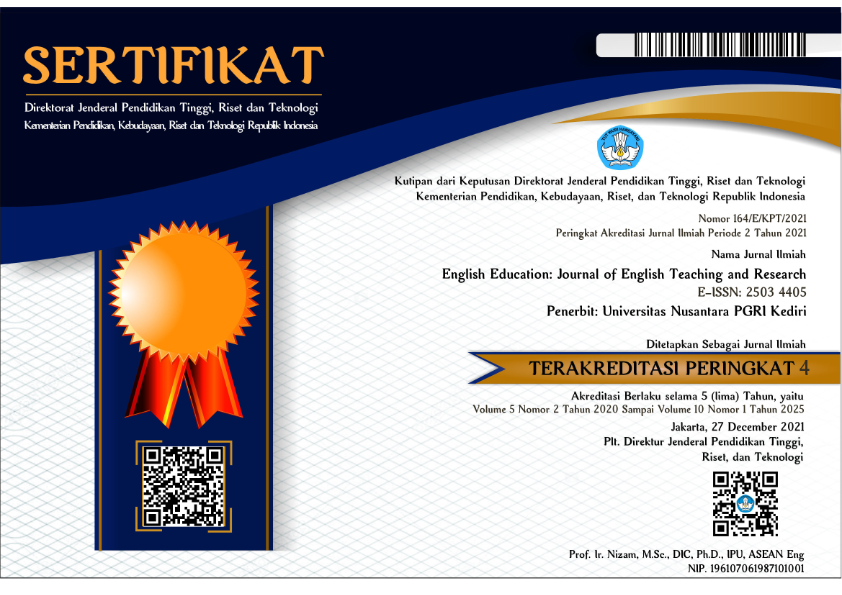Using Question Generation and Mind Mapping Strategy toward Students’ Reading of Descriptive Texts
DOI:
https://doi.org/10.29407/jetar.v9i1.19266Keywords:
Question Generation, reading comprehension, mind mappingAbstract
The purpose of this study was to find out the effect of a combination of question generation and mind mapping strategy toward reading comprehension of descriptive text. It was a quasi-experimental study at a private junior high school in Pontianak – Indonesia thatinvolved one control group and one experimental group. This applied cluster random to take the sample. The treatments were given four times. The data was collected through the reading comprehension test given to the control and experimental group. The data wereanalyzed with a t-test. It was to analyze the significance of the treatment. The research result showed that the t value isbigger than the ttable or t value > ttable. In short, the t value was 6.214 whilethe ttable was 1.9983, that the t value was biggerthan the ttable (6.214 > 1.9983) and the value of effect size was 1.49 meaning the combination between question generation and mind mapping strategy affected reading comprehension of descriptive text very strongly. Therefore, the combination of those strategies can be used to teach reading comprehension.
Downloads
References
Ahmadi, M. R., Ismail, H. N., & Abdullah, M. K. (2013). The importance of metacognitive reading strategy awareness in reading comprehension. Canadian Center of Science and Education. 6(10). 235-244. http://dx.doi.org/10.5539/elt.v6n10p235
Ary, D., Jacobs, L. C., & Sorensen, C. (2010). Introduction to research in education. New York: Wadsworth, Cengage Learning. p. 316.
Blerkom, M. V. (2009). Measurement and Statistics for Teachers. New York: Routledge. p. 6.
Cohen., L., Manion, L., & Morrison, K. (2007). Research Methods in Education. New York: Routledge Falmer. p. 272.
Creswell, W. J. (2012). Educational research: Planning, conducting, and evaluating quantitative and qualitative research fourth edition. Boston: Pearson inc. p. 309 & 381.
Davies, M. (2010). Concept mapping, mind mapping and argument mapping: what are the differences and do they matter? High Educ. 279-301. DOI 10.1007/s10734-010-9387-6
Dorkchandra, D. (2013). The effects of question generating strategy instruction on EFL freshmen’s reading comprehension and use of English tenses. Journal of Liberal Arts, Prince of Songkla University. 5(2). 32-45.
Duffy, G. G. (2009). Explaining reading: A resource for teaching concepts, skills, and strategies. New York: Guilford Press. p. 14.
Frechtling, J. (2002). The 2002 user-friendly handbook for project evaluation. Rockville: National Science Foundation, Westat. p. 55.
Gebre, B. M. (2016). Psycholinguistic Ambiance of short stories in enhancing students’ reading comprehension and vocabulary power. International Journal of Foreign Language Teaching and Research. 4(13). 97-108.
Hiebert, E. H., & Kamil, M. L. (2005). Teaching and learning vocabulary. London: Lawrence Erlbaum Associates. p. 57.
Lodico, M. G., Spaulding, D. T., & Voegtle, K. H. (2010). Methods in educational research: From theory to practice. San Francisco: John Wiley & Sons. p. 234.
Look, S. M. (2011). Question generation: Effective instructional strategies series. Hawai‘i: Prel. p. 11.
Male, H., & Tias, H. A. (2019). Using Mind Mapping to Improve Students’ Reading Comprehension at SMK BPS&K II Bekasi. Proceeding of EED Collegiate Forum 2015-2018. 54-65.
McShane, S. (2005). Applying research in reading instruction for adults first steps for teachers. Washington: The National Institute for Literacy. p. 73.
Ramadhan, S., Regina, & Salam, U. (2015). Teaching reading through mind mapping strategy in narrative text for reading comprehension. Jurnal Pendidikan dan Pembelajaran Khatulistiwa. 1-10.
Rasinger, S. M. (2008). Quantitative research in linguistics. London: Blomsberry Academic. p. 45.
Rosenshine, B., Meister, C., & Chapman, S. (1996). Teaching students to generate questions: A review of the intervention studies. Review of Educational Research. 66(2). 181-221. DOI: 10.3102/00346543066002181.
Sabbah, S. S. (2020). The Effect of Semantic Mapping and Question Generation Teaching Strategies on English as a Second Language Tertiary Students’ Reading achievement. Arab World English Journal (AWEJ). 11(1). 138-153. https://dx.doi.org/10.24093/awej/vol11no1.12
Snow, C. (2002). Reading for understanding: Toward an R&D program in reading comprehension. New York: Rand Corporation. p. 11.
Stokhof, H., Vries, B. D., Bastiaens, T., & Martens, R. (2020). Using mind maps to make student questioning effective: Learning outcomes of a principle-based scenario for teacher guidance. Research in Science Education. 50(1). 203-225. https://doi.org/10.1007/s11165-017-9686-3
Woolley, G. (2011). Reading comprehension assisting children with learning difficulties. New York: Springer. p. 15.
Yu, F.-Y., Chang, Y.-L., & Wu, H.-L. (2015). The effects of an online student question-generation strategy on elementary school student English learning. Research and Practice in Technology Enhanced Learning. 10(24). 1-16. DOI 10.1186/s41039-015-0023-z
Downloads
Published
Issue
Section
License
Copyright (c) 2024 Atikah, Ikhsanudin, Dwi Riyanti

This work is licensed under a Creative Commons Attribution-ShareAlike 4.0 International License.
Authors who publish with this journal agree to the following terms:
- Copyright on any article is retained by the author(s).
- The author grants the journal, the right of first publication with the work simultaneously licensed under a Creative Commons Attribution License that allows others to share the work with an acknowledgment of the work’s authorship and initial publication in this journal.
- Authors are able to enter into separate, additional contractual arrangements for the non-exclusive distribution of the journal’s published version of the work (e.g., post it to an institutional repository or publish it in a book), with an acknowledgment of its initial publication in this journal.
- Authors are permitted and encouraged to post their work online (e.g., in institutional repositories or on their website) prior to and during the submission process, as it can lead to productive exchanges, as well as earlier and greater citation of published work.
- The article and any associated published material is distributed under the Creative Commons Attribution-ShareAlike 4.0 International License








 Article template
Article template



